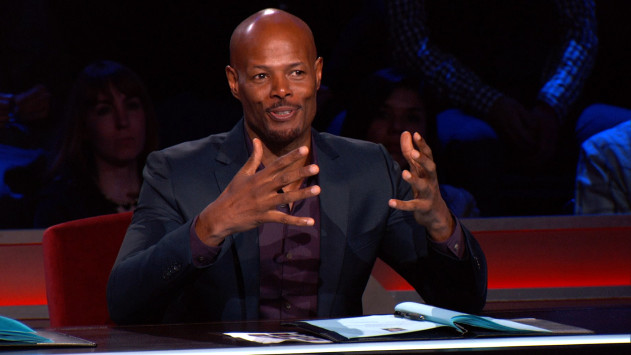I have a lot of questions for Wayans, including: What is “girly humor”? Why is it bad? And why does “edge” make humor less “girly”?
On Wednesday night’s season premier of “Last Comic Standing,” judge Keenen Ivory Wayans said the following to comedienne Esther Povitsky:
“Initially when you came out, I didn’t think I was going to like you…No, no I’m being honest! Because it was almost like…(does hand gesture) girly humor. But then, as you progressed, you started to add this edge to it. And I think that’s where you need to take your act because, initially, as a guy, you feel like ‘oh, I’m not gonna get this.’ And the more you add that edge to you, the better I think it is. I enjoyed you.”
I have a lot of questions for Wayans, including: What is “girly humor”? Why is it bad?Why does “edge” make humor less “girly”? Also, seriously, what are you talking about and why did you say this on national television?
Now, if she had come out in a pink tutu and sparkly heels (certainly her right), then she might have been self-selecting into a “girly” niche that, sure, might turn some guys off to her comedy. Not that exuding femininity is bad, wrong, or unfunny (I personally make a point of wearing dresses on stage, actually), but OK, presenting as a very feminine stand-up comic is a performance choice, and I wouldn’t be mad about a judge discussing it in an intelligent way as a performance choice.
However, that was absolutely not the case. She was wearing the poster-child of generic outfits: jeans, a black shirt, and sneakers. Wayans’ point was literally that a petite white female walked on stage so—“as a guy”—his instinct was to assume her material would not be relatable, interesting, or entertaining to him. And by saying “as a guy,” he’s not saying this is his unique, personal feeling—he’s implying that this is how all men feel and it’s her problem to work through.
Of course people bring their experiences and identities into their stand-up comedy, and sure, an audience member might get an extra kick out of someone he or she really identifies with. But with women representing half (or more) of most stand-up audiences (and also, you know, the world in general), the expectation that a woman will speak from a woman’s perspective shouldn’t be seen as a liability or hurdle to overcome.
If you think he has a point or this comment is acceptable in any way, let’s play this old game: Replace “girly” with another (sociological) minority group. Can you imagine an African-American comedian coming to the stage in jeans, sneakers, and a black T-shirt, and a white judge saying “initially when you came out, I didn’t think I was going to like you…because it was almost like (gestures vaguely) blackish humor”?
He’s basically saying, “When you came to the stage, I pre-judged you because we’re not used to hearing from people like you, so I assumed I wouldn’t be able to understand it or like it. Oh, and that’s your problem to work through and sell it to me.”
In this case, “girly” humor is what he doesn’t get as a representative of all men, so adding “edge” makes it palatable to him (and all men) and makes it better.
We live in a culture where white male perspectives, stories, and experiences are the default and anything else is niche. We all empathize with white men because, well…if we didn’t, we would be unable to enjoy, understand, or relate to the vast majority of media/entertainers. Regardless of our own race, gender, sexual orientation, religious beliefs, abilities, etc., we can generally relate to white guys because they are usually the protagonists and the leaders who we see. We’ve been practicing our whole lives, from the children’s books we cherish to that awesome new summer blockbuster we loved to the political leaders we give power to, and yes, the comedians who make us laugh. So yes, Keenan is black, but he is very unlikely to pre-judge a white male comic in the same way because we all can relate to that at this point.
It’s essential to empathize with people who are different than ourselves, recognize their full humanity, and laugh with them. I do not resent identifying with white men. The issue is—because white men are elevated and in the spotlight—we can all see them, but they’re the only ones up there, so they don’t really see everyone else. And since most of us are looking up at those bright, shiny, raised up white men, we don’t always see each other, either. Stand-up requires empathy from the audience.
I’m not saying we all have to love every comedian. It’s totally valid to be critical of comedians, and no judge is obligated to love everyone. I appreciate that Wayans did actually listen to her jokes and somewhat come around, but he did not appear to understand that his instinct to write her off was sexist and absurd. The solution for absurd prejudices should not be for the minority member to adapt, assuage all of the majority’s assumptions, and show that they aren’t like those other minority members (in this case, “she’s not girly like the rest of the ladies, she’s edgy!”).
Maybe we can all try listening to people for who they are without making assumptions, pigeonholing them, or asking them to adapt to speak with more of a white, male voice. It’s important. And it could be funny.
Dana Fleitman is the Senior Manager of Prevention and Training Programs at JWI, the leading Jewish organization working to end violence against all women and girls. She is also a stand up comedian. Not usually at the same time. She is based in Washington, D.C.
Related Links:

